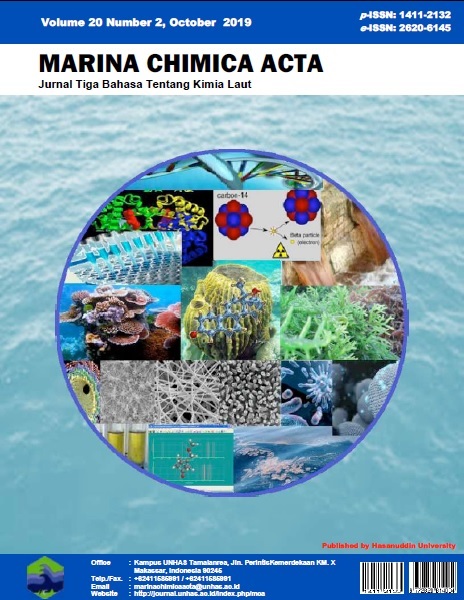THE EXISTENCE OF PLASTIC WASTE MANAGEMENT IN THE SEA ENVIRONMENT SEEN FROM CHEMICAL SCIENCE ANGLE
Abstract
Plastic waste from year to year in the marine environment continues to increase. This is due to its wide application and its resistance to degradation making it difficult or impossible to decompose. Plastic waste has been found in various sizes and accumulated in the body of marine life. The existence of plastic waste in the body of the marine biota even causes death. This review discusses the latest advances in research and development of methods for handling plastic waste in the marine environment.References
Barnes, D. K. A. Galgani, F., Thompson, R. C. Barlaz, M. 2009, Accumulation and fragmentation of plastic debris in global environments. Philos.Trans.R.Soc.B364, 1985– 998.
Agyeman, S., Obeng-Ahenkora, N. K., Assiamah, S., and Twumasi, G. (2019). Exploiting recycled plastic waste as an alternative binder for paving blocks production. Case Studies in Construction Materials, 11, e00246.
Geyer, R., Jambeck, J. R., and Law, K. L. (2017). Production, use, and fate of all plastics ever made. Sci. Adv., 3(7), e1700782.
Akinwumi, I. I., Domo-Spiff, A. H., and Salami, A. (2019). Marine plastic pollution and affordable housing challenge: Shredded waste plastic stabilized soil for producing compressed earth bricks. Case Studies in Construction Materials, 11, e00241.
Sya'diah S. H., 2014, Characteristics and Consumers' Knowledge of the Reduce and Reuse Principle and Participation in Using Shopping Bags Instead of Plastic Bags at the Carrefour Medan Fair, Universitas Sumatera Utara, Medan.
Kumar, A. G., Anjana, K., Hinduja, M., Sujitha, K., dan Dharani, G. (2019). Review on plastic wastes in marine environment – Biodegradation and biotechnological solutions. Marine Pollution Bulletin, 110733.
Mattsson, K., Hansson, L.-A., Cedervall, T., 2015. Nano-plastics in the aquatic environ- ment. Environ. Sci. Proces. and Impacts. 1–17.
Eriksen, M., Lebreton, L.C.M., Carson, H.S., Thielm, M., Moore, C.J., 2014. Plastic pol- lution in the world's oceans: more than 5 trillion plastic pieces weighing over 250,000 tons afloat at sea. PLoS One 9 (12), 1–15.
Lebreton, L., Slat, B., Ferrari, F., Sainte-Rose, B., Aitken, J., Marthouse, R., Hajbane, S., Cunsolo, S., Schwarz, A., Levivier, A., Noble, K., Debeljak, P., Maral, H., Schoeneich- Argent, R., Brambini, R., Reisser, J., 2018. Evidence that the great pacific garbage patch is rapidly accumulating plastic. Sci. Rep. 8, 1–15.
Vered, G., Kaplan, A., Avisar, D., Shenkar, N., 2019. Using solitary ascidians to assess microplastic and phthalate plasticizers pollution among marine biota: a case study of the Eastern Mediterranean and Red Sea. Mar. Pollut. Bull. 138, 618–625.
Song, Y.K., Hong, S.H., Jang, M., Han, G.M., Jung, S.W., Shim, W.J., 2017. Combined effects of UV exposure duration and mechanical abrasion on microplastic fragmen- tation by polymer type. Environ. Sci. Technol. 51 (8), 4368–4376.
Lusher, A. L., Peter H dan Jeremy M. (2017). Microplastics in Fisheries and Aquaculture. Roma: Food and Agriclture Organization of The United Nations.
Widianarko B., Hantoro I., (2018), Microplastic in Seafood from the North Coast of Java, Soegijapranata Catholic University, Semarang.
Boerger, C. M., Lattin, G. L., Moore, S. L., dan Moore, C. J. (2010). Plastic ingestion by planktivorous fishes in the North Pacific Central Gyre. Marine Pollution Bulletin, 60(12), 2275–2278.
Rochman, C. M., Tahir, A., Williams, S. L., Baxa, D. V., Lam, R., Miller, J. T., Teh, F.-C., Werorilangi, S., dan Teh, S. J. (2015). Anthropogenic debris in seafood: Plastic debris and fibers from textiles in fish and bivalves sold for human consumption. Scientific Reports, 5(1), 14340.
Devriese, L. I., van der Meulen, M. D., Maes, T., Bekaert, K., Paul-Pont, I., Frère, L., Vethaak, A. D. (2015). Microplastic contamination in brown shrimp (Crangon crangon, Linnaeus 1758) from coastal waters of the Southern North Sea and Channel area. Marine Pollution Bulletin, 98(1– 2), 179–187.
Li J., X. Qu., L. Su., W. Zhang, D. Yang, P. Kolandhasamy, D. Li, and H. Shi. 2016. Microplastics in mussels along the coastal waters of China. Environmental Pollution, 214: 177 – 184
Santana, M. F. M., Ascer, L. G., Custódio, M. R., Moreira, F. T., dan Turra, A. (2016). Microplastic contamination in natural mussel beds from a Brazilian urbanized coastal region: Rapid evaluation through bioassessment. Marine Pollution Bulletin, 106(1), 183-189.
Rudolph N., Kiesel R., dan Aumnate C., 2017, Understanding Plastics Recycling; Economic, Ecological, and Technical Aspects of Plastic Waste Handling, Hanser Publishers, Madison.
University of Cambridge and University of Cambridge-MIT Institute. 2005.The ImpEE Project: Re cycling of Plastics. Department of Engineering, University of Cambridge, Cambridge, UK.

